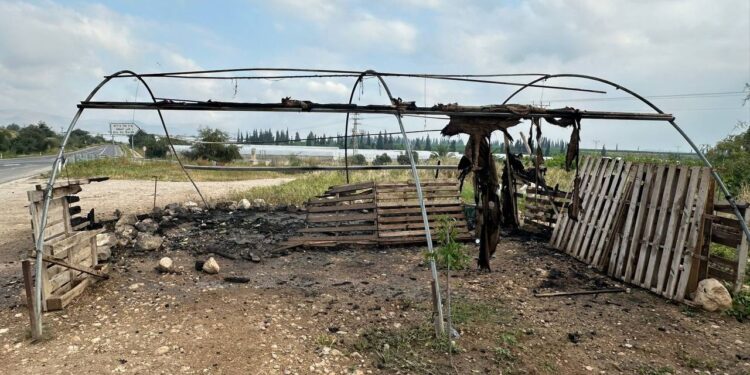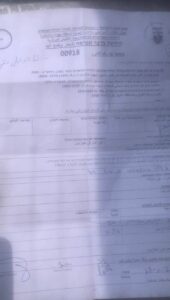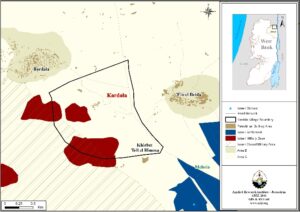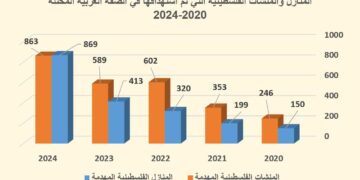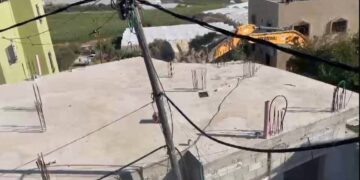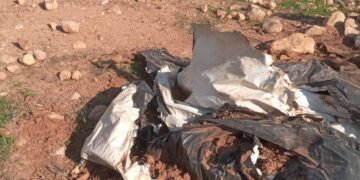In a series of deliberate and systematic assaults, Israeli settlers backed by the Israeli Army have repeatedly targeted the fruit and vegetable stand owned by Shadi Fuqaha, a resident of the vilJlage of Kardala. These relentless attacks have deprived the Fuqaha family of their primary source of income, deepening their already shaking economic conditions. The ongoing aggression reflects a broader Israeli policy aimed at crippling the Palestinian economy and displacing citizens from their lands.
Route 90: A Strategic Chokehold for Palestinian Farmers
Route 90 is a major Israeli bypass road that connects settlements and outposts along the eastern West Bank, specifically in the Jordan Valley. Due to its proximity to Palestinian villages and the severe movement restrictions imposed by Israeli checkpoints and closures, it has become the primary access road for Palestinian communities in the region.
Given that these Palestinian villages are mainly agricultural, the residents depend on farming for their livelihoods. Like many others, Shadi Fuqaha sought to sustain his family by selling fresh produce along Route 90. However, his modest stand has been the target of systematic settler aggression and Israeli military measures aimed at undermining his ability to sustain a livelihood.
Targeted Sabotage and Systematic Destruction
Four years ago, Shadi Fuqaha established his fruit and vegetable stand. Since then, he has faced a series of systematic attacks orchestrated by settlers and supported by the Settlement Council. These attacks have ranged from theft and vandalism to outright demolition and arson. Over the past few years, the stand has been destroyed six times, each incident inflicting significant financial losses on the family. Despite the repeated destruction, Shadi has remained determined, continuously rebuilding his business, yet suffering growing financial damages amounting to 24,000 shekels.
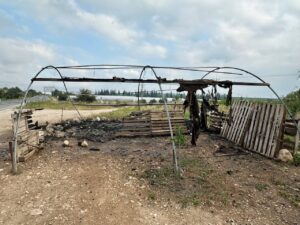 Shadi Fuqaha vending stand along route 90
Shadi Fuqaha vending stand along route 90
 Shadi Fuqaha vending stand after being destroyed
Shadi Fuqaha vending stand after being destroyed
In addition to settler violence, Israeli authorities have imposed arbitrary military orders to further strangle his livelihood. In one instance, the Israeli army issued a military confiscation order to seize all of Shadi’s merchandise, effectively cutting off his sole source of income. This confiscation, carried out under the pretext of a “possession” notice, has further intensified the family’s economic hardship.
Collective Punishment Against Farmers
Shadi Fuqaha is not alone in this ordeal. At least six other farmers have been subjected to similar measures, with Israeli authorities banning them from reestablishing their stands along Route 90. Those who aJyet another open and disgraceful violation of international humanitarian law and fundamental human rights.
Kardala: A Community Under Threat
Kardala is a small Palestinian village located northeast of Tubas, approximately 13.5 km away by air. The village is bordered by Ein al-Baida and the Israeli settlement of Mehola to the east, Bardala to the north, Jabaris, Barda, Wadi al-Malih, and al-Mudaribah al-Bada to the west, and al-Malih, al-Hamma, al-Farisiya, and the settlement of Mehola to the south.
Currently, Kardala has a population of 350 residents, with women making up 60% and men 40%. The village spread across a total area of 10,000 dunums and is primarily reliant on agriculture as its main source of livelihood. However, the escalating Israeli restrictions, settler violence, and land confiscation policies pose an imminent threat to the community’s survival. The international community must recognize these actions as deliberate violations of Palestinian rights and hold Israel accountable for its continuous breaches of international law.
Prepared as part of the project:
“Mapping and Diagnosing Palestinian Rural Women’s Livelihood and Economic Empowerment in Area “C”
Implemented by: The Applied Research Institute-Jerusalem (ARIJ)
Prepared by:
The Applied Research Institute – Jerusalem


